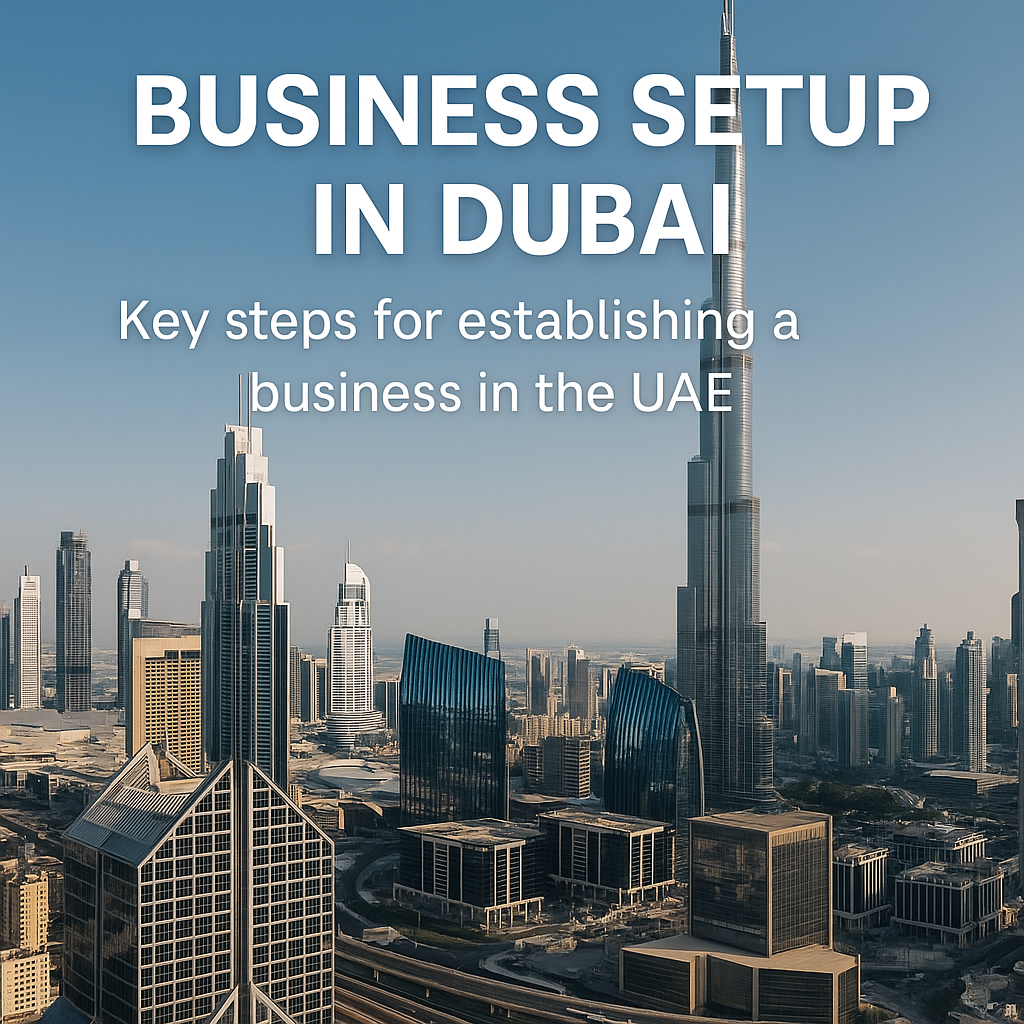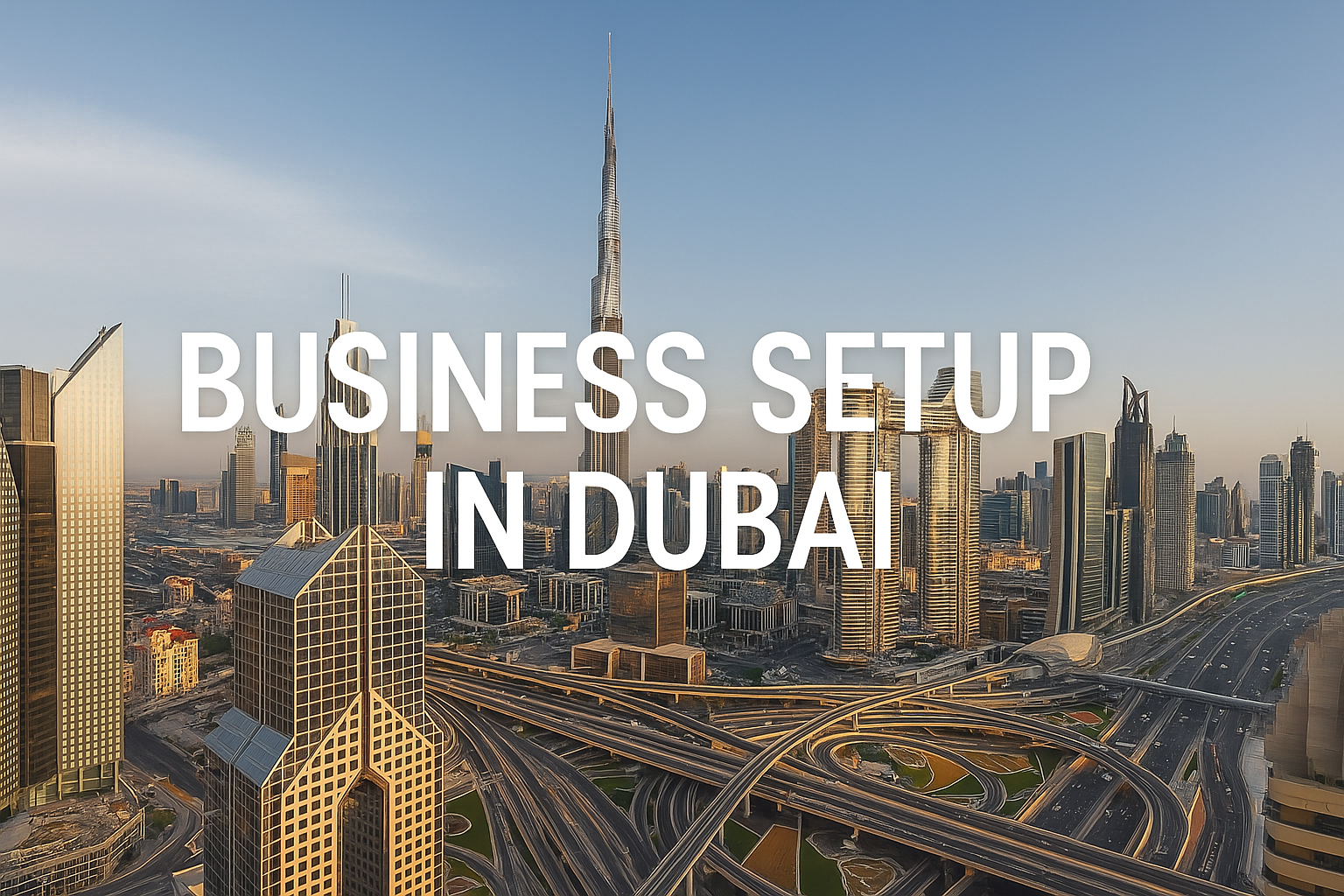Business setup in Dubai has become increasingly attractive to entrepreneurs and investors aiming to establish their operations in the Middle East. Thanks to its strategic location between East and West, supportive government policies, and world-class infrastructure, the UAE presents strong opportunities for launching and growing a business. This guide outlines the key steps involved in business setup in Dubai, whether you’re looking at free zone options or considering a mainland structure.
Table of Contents
Table of Contents
Understanding the Business Environment in the UAE
The UAE, particularly Dubai, provides a unique business ecosystem characterized by:
- Strategic geographic positioning between Europe, Asia, and Africa
- Political stability and progressive governance
- World-class infrastructure and connectivity
- Multicultural workforce and international business community
- Tax advantages and investment incentives
- Innovation-focused economic policies
This environment makes Dubai an attractive hub for international commerce, allowing businesses to access emerging markets while enjoying the benefits of a sophisticated business infrastructure.
Starting a Business in the UAE: Key Considerations
The journey of establishing a business in the UAE begins with understanding your specific needs and choosing the right structure. The UAE government has streamlined the process considerably, making entrepreneurship more accessible than ever before.
When planning your business setup, consider:
- Target market and customer base
- Business activities and licensing requirements
- Optimal location (free zone vs. mainland)
- Long-term growth strategy
- Banking and financial requirements
- Visa needs for yourself and employees
Working with experienced consultants can provide valuable guidance through these considerations, ensuring you make informed decisions aligned with your business objectives.
The Business Setup Process Explained

Setting up a business in Dubai involves establishing a legal entity that complies with local regulations while supporting your operational needs. The process encompasses company registration, licensing, securing premises, and meeting all regulatory requirements.
Professional consultants play a crucial role in facilitating this process by:
- Providing regulatory compliance expertise
- Advising on optimal setup options
- Handling documentation and applications
- Facilitating license acquisition
- Assisting with visa processing
- Supporting bank account opening
Their expertise ensures your business launch proceeds smoothly while remaining fully compliant with UAE laws and regulations.
Permitted Business Activities in the UAE
The UAE welcomes a diverse range of business activities across various sectors, including:
- Trading and Commerce: Import/export, wholesale, retail, e-commerce
- Professional Services: Consulting, legal, accounting, management
- Technology: Software development, IT services, fintech, digital media
- Manufacturing: Light manufacturing, assembly, industrial services
- Tourism and Hospitality: Hotels, travel agencies, restaurants, event management
- Healthcare and Education: Medical facilities, schools, training institutes
Each activity category has specific licensing requirements and operational considerations that will influence your setup decisions.
Free Zone Business Establishment
Free zones represent specialized economic areas with distinct regulatory frameworks designed to attract foreign investment through incentives and simplified procedures.
Advantages of Free Zone Establishment
Free zones offer numerous benefits for international entrepreneurs:
- Complete foreign ownership (100%)
- Zero corporate and personal income taxes
- Exemption from import/export duties
- Simplified administrative procedures
- Comprehensive business support services
- Ability to sponsor employee and family visas
- Full repatriation of capital and profits
The Free Zone Setup Process
Establishing a business in a free zone typically follows these steps:
- Select your preferred free zone (IFZA, Meydan, etc.)
- Choose business activities and license type
- Reserve company name
- Prepare and submit documentation
- Receive initial approval
- Secure necessary clearances
- Finalize setup and collect license
Popular free zones like IFZA Free Zone offer digital-first approaches with online document submission and fast-track processing options, while Meydan Free Zone provides excellent location advantages and flexible office solutions.
Understanding Setup Costs for Business Setup in Dubai
Business setup costs vary based on location, business activities, and specific requirements. Typical expenses include:
Initial Setup Expenses
- License fees: AED 10,000-100,000 annually
- Registration fees: AED 10,000-50,000+
- Office space: AED 5,000 (virtual) to AED 80,000+ (physical)
- Visa costs: AED 3,500-7,000 per person
- Additional services: AED 1,000-10,000
Comparative Cost Analysis
IFZA:
- Trading license: From AED 12,900 annually
- Service license: From AED 11,900 annually
- Industrial license: From AED 15,900 annually
- Visa packages: From AED 3,750 per visa
Meydan Free Zone:
- Standard packages: AED 12,500-25,000 annually
- Premium packages: AED 30,000-60,000 annually
- Additional visas: AED 3,750-6,000 per visa
Additional Considerations
Remember to budget for professional services (legal, accounting), banking fees, insurance, and annual renewal costs to maintain your business operations.
Mainland vs. Free Zone: Making the Right Choice
One of the most significant decisions when establishing a business in the UAE is choosing between mainland and free zone options. Each provides distinct advantages suited to different business models.
Mainland Business Features
Mainland companies operate under UAE commercial law with:
- Unrestricted market access throughout the UAE
- Ability to participate in government tenders
- Flexibility in business activities and location
- Broader banking options
- Possible requirement for local partnership (though recent changes allow 100% foreign ownership in many sectors)
Free Zone Advantages
Free zone entities benefit from:
- Complete foreign ownership without local partnership
- Tax efficiencies including zero corporate tax
- Streamlined administrative procedures
- Centralized government services
- Strong support for international trade
Your choice should reflect your business model, target market, long-term strategy, and operational preferences. Companies focusing on the local UAE market often benefit from mainland setup, while internationally oriented businesses may prefer free zones.
Obtaining a Business License
A business license is fundamental to legal operation in the UAE. Different license types accommodate various business activities:
- Trading License: For import, export, and distribution
- Service License: For consulting and professional services
- Industrial License: For manufacturing and production
- Professional License: For specialized practitioners
- Tourism License: For travel and hospitality businesses
Mainland License Process
For mainland businesses, the license acquisition process involves:
- Identifying your business activities
- Determining legal structure
- Registering your trade name
- Securing initial approval
- Creating necessary agreements (LSA or MOA)
- Selecting business premises
- Obtaining additional approvals if required
- Submitting documentation
- Paying fees and collecting license
- Registering with the Chamber of Commerce
Documentation Requirements
Typical requirements include:
- Shareholder and manager identification documents
- Professional certificates (where applicable)
- Company formation documents
- Office lease or Ejari registration
- Proof of financial capability
- Relevant NOCs and approvals
Professional Business Setup Services
Business setup consultants provide valuable services that streamline the establishment process:
Comprehensive Service Offerings
Leading consultants offer:
- Pre-setup consultation and planning
- Company formation and registration
- License application and processing
- Document preparation and submission
- Office procurement assistance
- Bank account opening support
- Visa processing services
- Post-setup compliance guidance
The Value of Professional Guidance
Working with experienced consultants provides:
- Expert knowledge of regulations and procedures
- Time efficiency through established processes
- Cost optimization through strategic planning
- Risk mitigation and compliance assurance
- Comprehensive support throughout the business lifecycle
Selecting the Right Consultant
When choosing a business setup partner, consider:
- Industry experience and expertise
- Range of services offered
- Pricing transparency
- Client support quality
- Government relationships
- Additional value-added services
Business Opportunities in the UAE
The UAE market offers diverse opportunities across multiple sectors:
Growing Sectors
- Technology and Digital Innovation: AI, blockchain, fintech, e-commerce
- Sustainability: Renewable energy, green building, environmental services
- Healthcare: Medical facilities, wellness services, telemedicine
- Education: International schools, training institutes, online learning
- Logistics: Warehousing, distribution, supply chain management
- Food and Beverage: Restaurants, specialty imports, food technology
Finding Your Niche
Success requires careful consideration of:
- Market demand and competition analysis
- Regulatory environment and compliance requirements
- Investment capital needs and funding options
- Growth potential and scalability
- Unique value propositions and competitive advantages
Strategies for Business Growth
Expanding your UAE business involves:
- Building local partnerships and networks
- Establishing strong digital presence
- Aligning with government initiatives
- Participating in industry associations
- Developing cultural understanding
- Fostering innovation and adaptability
Frequently Asked Questions for Company Formation in Dubai
How much does business setup cost in the UAE?
Costs vary significantly based on location and business type. Free zone setup typically ranges from AED 12,000 to AED 50,000+ annually, while mainland setup costs range from AED 15,000 to AED 70,000. Additional expenses bring total first-year costs to AED 20,000-100,000 for most businesses.
What are the steps to start a small business in the UAE?
Start by choosing between free zone or mainland options, select your business activities, secure appropriate licensing, establish your office presence, complete required documentation, and set up your business bank account.
Which businesses show the most promise in the UAE?
Technology services, e-commerce, consultancy, healthcare, education, and sustainability-focused businesses currently show strong growth potential in the UAE market.
How do I establish an e-commerce business in the UAE?
E-commerce businesses typically require trading or service licenses and can benefit from free zone setup. Key steps include company formation, securing necessary permits, establishing payment gateways, and ensuring compliance with UAE e-commerce regulations.
Can I open a branch of my existing company in Dubai?
Yes, you can establish a branch office of your existing company as a mainland business. This requires registration with the Department of Economic Development and typically takes 2-4 weeks with professional assistance.
Conclusion on Dubai Business Setup
Establishing a business in Dubai opens doors to one of the world’s most dynamic markets. Whether you choose a free zone or mainland approach, the UAE offers exceptional advantages for entrepreneurs and investors seeking international expansion.
The key to success lies in understanding the available options, making strategic decisions aligned with your business goals, and navigating the setup process efficiently. Professional guidance can significantly enhance this journey, ensuring compliance while optimizing your operational framework.
As the UAE continues its economic evolution through initiatives like Vision 2071 and the Dubai Economic Agenda 2033, opportunities will continue to emerge across diverse sectors. Businesses that establish a strong foundation now position themselves for long-term growth in this vibrant market.
Ready to Begin Your UAE Business Journey?
Don’t let complexity delay your entrepreneurial ambitions. Our experienced team of business consultants is ready to guide you through every step of the process, from initial consultation to operational launch.
Our comprehensive services include:
- End-to-end setup guidance
- License acquisition support
- Bank account establishment
- Visa processing assistance
- Post-setup compliance management
- Ongoing business support
Ready To Start your Business
Contact us today for a complimentary consultation to discuss your specific requirements. Our experts will help you identify the optimal structure for your business, streamline the setup process, and establish a strong foundation for success in the UAE market.
📞 Call us now or 📧 email us to schedule your free consultation and take the first step toward establishing your business in Dubai.
Transform your business vision into reality with professional guidance and comprehensive support. Your success in the UAE market begins with the right partnership.

